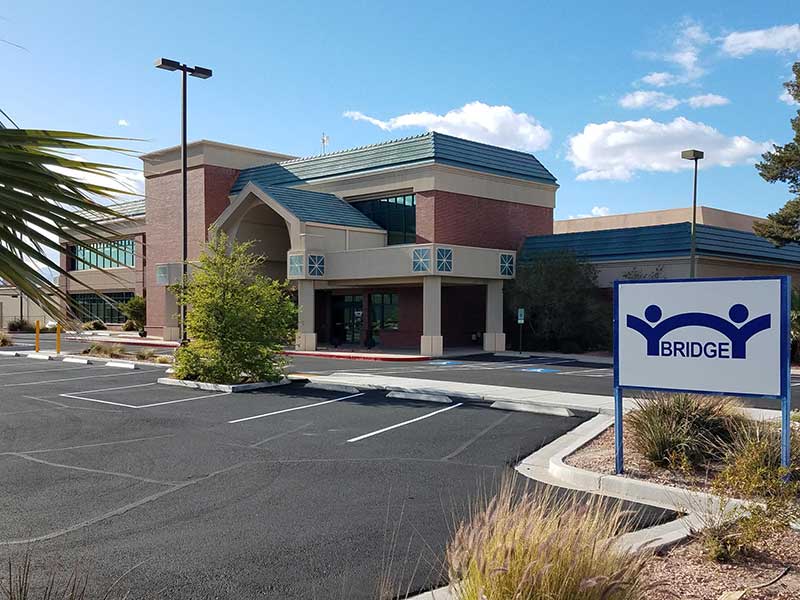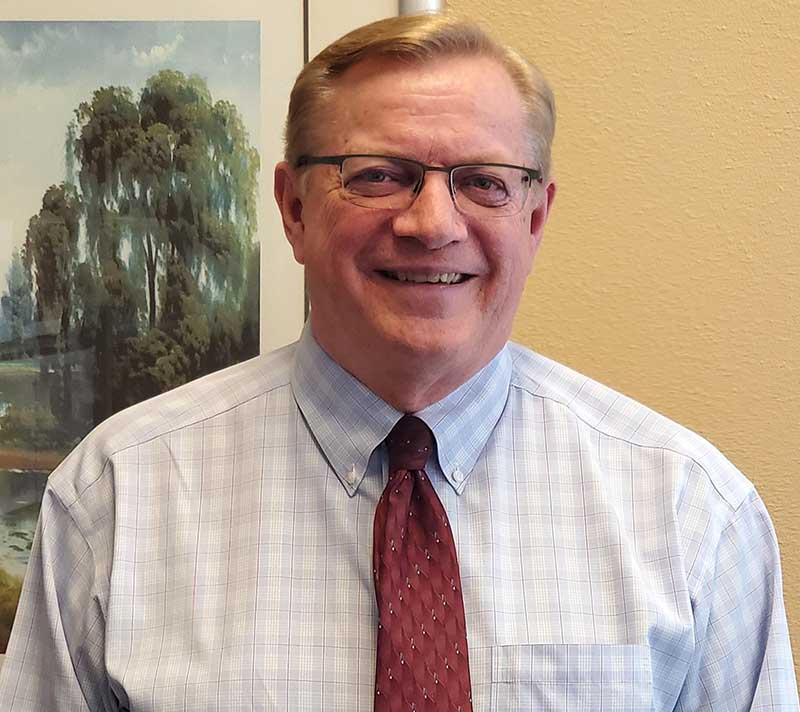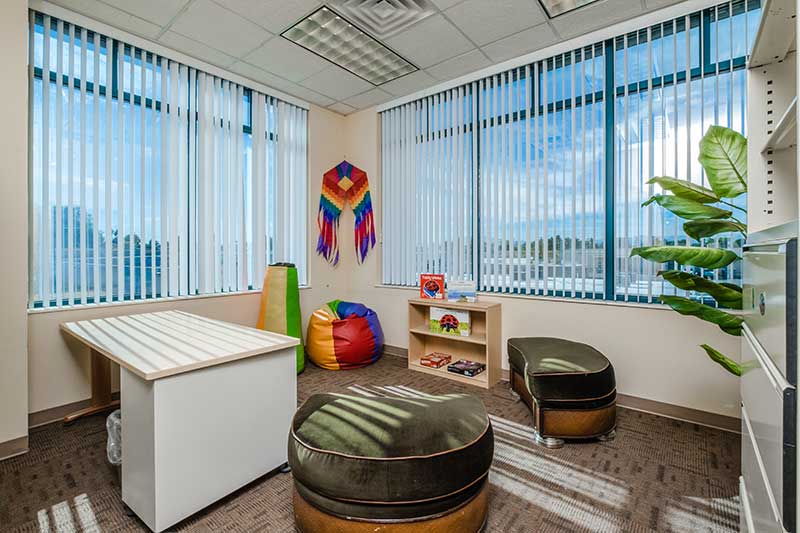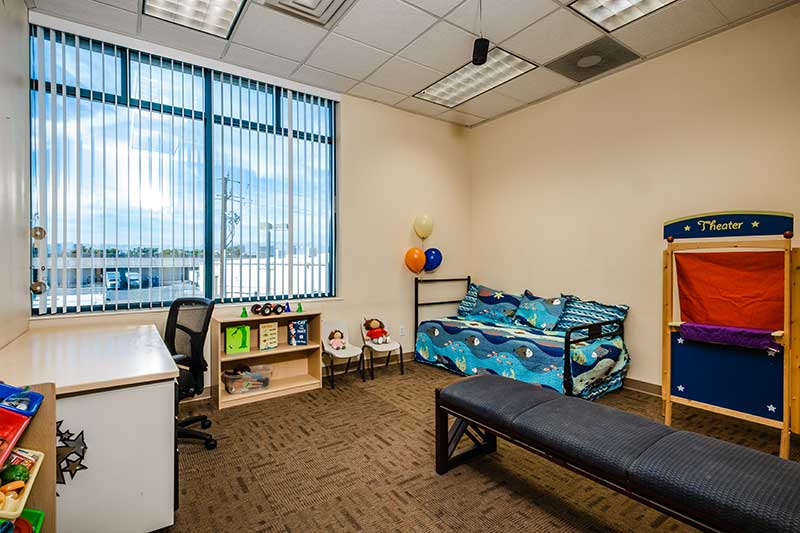
Bridge
Bridge Counseling: Creating a Legacy of Caring for Others
BY JOAN S. PECK
Have you ever met an Earth Angel? I believe I did when I was introduced to David Robeck, President/CEO of Bridge – Certified Community Behavioral Health Clinic. What makes him so unique, you might ask?
As a start, he straightened out the nonprofit’s mess when he joined it and made it increasingly profitable by obtaining a national accreditation and improving stakeholder relationships, which enabled Bridge to purchase a second location at 4221 McLeod Drive in 2018. Redesigning and overseeing the new reconstruction of the 46,000 sq. ft. building (the former Silver State Schools Credit Union headquarters) was a formidable task that allowed him to focus on setting up a large number of shelter beds for adults in outpatient treatment.

David Robeck
Where did this drive come from? Brought to Las Vegas as an infant, David grew up with both parents serving as pastors at the (then-named) Assembly Bible Church. There weren’t many social services available back then, and in cities and towns everywhere, people needing support sought out the churches to help them. Often, it was David who entertained the children while their parents spoke with his parents. It was just the beginning of David caring for others, particularly the children.
David served as a Peace Corps Volunteer in Russia for two years. He specialized in business and fulfilled President Boris Yeltsin’s business-focused request (David had an MBA and 13 years of banking experience at that time). He spent time advising governments and banks and connecting several new nonprofit agencies to western agencies such as Muscular Dystrophy by hosting regional, nonprofit conferences. He remained in Russia developing small business lending programs at seven banks in three cities as a representative of the European Bank for Reconstruction and Development. After four years in Russia, David returned to Las Vegas with two sons he adopted in 1997 from Russian orphanages.
In 2003, he returned to Russia to adopt two biological brothers, completing his family with five energetic males. Always community-minded, David left his 25-year banking career and sought work with nonprofits. After leaving a position with The Salvation Army, David joined Bridge Counseling as the President and CEO. It was there that his love for helping children could be expanded, in addition to his belief that treatment was essential to move children forward in a healthy way.
How does David feel about his work there? “When I talk about this place, I cry a lot.”
His reasons for tears? According to the 2020 State of Mental Health in America report, Nevada’s mental health system ranks 51st in the country and 51st in youth mental health. The issue of children’s mental health and well-being in Nevada is mounting with an increased need for more facilities and services. At present, our valley has only two children’s mental health facilities, both of which are severely underfunded and understaffed, one of which is slated to close.
Today, many mental health issues face us, especially for the young who have suffered through COVID-19 being isolated and their propensity to escape through drugs and alcohol. There have even been reports of parents surrendering their children to child welfare with the hope of getting them mental health services.

It can be easy to forget those children too young to advocate for themselves. These children are removed from inhumane conditions such as starvation, neglect, physical and sexual abuse, and violence, and are often victims of addiction, then get taken into custody by child welfare.
In hopes of turning this narrative around, Bridge Counseling opened its doors on November 15 to its Child and Youth Community Treatment Center, supported by a $500,000 grant from Nevada Women’s Philanthropy (NWP). It adds six new state-of-the-art children’s treatment rooms providing evidence-based counseling services tailored specifically for children. Also focused on children is funding for three new therapists and specialized training for all therapists working with children and adolescents.
As a nonprofit, Bridge Counseling won’t turn anyone away for inability to pay, so they can help vulnerable, underserved children who need it the most. They are there to help kids build useful lives, creating a snowball effect to break the cycle for other issues in our community.
Bridge Counseling Associates is one of the first Certified Community Behavioral Health Clinics (CCBHC) in the nation, providing a comprehensive range of mental health and substance use disorder services. It employs some 50 therapists, most holding dual Nevada licensure in mental health and substance abuse.
Other services include:
- Trauma
- Domestic Violence
- Sexual Abuse
- Adolescent and Youth
- Problem Gambling
The partnership that Bridge Counseling has with Nevada Women’s Philanthropy is significant in light of the grant money received from them. NWP remains very supportive during the funding process and helps connect its funded agencies with one another for the benefit of the community. This goes well with Bridge’s strategy, which developed over 30 formal memoranda of understanding with other nonprofit and government agencies.

What do you worry about most for the health of our children?
DR: “Social media has become far too prevalent in our homes to the point of being babysitters for even the youngest children. That results in too much screen time and not enough family interaction or outdoor activity. Many children find games that require purchases to get to higher levels of success, even using a parent’s debit or credit card for such purchases. These finance companies have no obligation to waive those fees unless the parent holds the child criminally accountable. Parental controls are inadequate with young adolescents who find inappropriate friends, experience body shaming, bullying, or experience addictive behaviors to their virtual activities. Ironically, because of the COVID pandemic, schools have ignored CDC guidelines limiting computer activity by age. All of these activities isolate the child and the family, limiting direct socialization and stunting the development of good family relationships, resulting in more serious mental health issues such as anxiety and depression.”
What has been the most rewarding about leading Bridge Counseling?
DR: “From serving several hundred clients annually, I’m proud that we are now helping many thousands in Clark County and throughout the state via telehealth. I have focused our work on mental health therapy, which includes the subcategory of substance abuse treatment, allowing our clinicians to expand and deepen Bridge’s level of behavioral health. My job is not to be a top-down CEO but to be the supportive CEO that responds to the needs of therapists and support staff while eliminating obstacles that clients face in completing their treatment. I’m so pleased that clients now have very short appointment waits to see our onsite psychiatrist or one of our two nurse practitioners for medication management or medical assessments. Case managers help eliminate or improve transportation, housing, employment, and other challenges that distract clients from their mental health recovery. Bridge will soon provide a detox facility and a residential treatment facility for adults. Just as exciting is our Community Development Block Grant that will fund a new Psychiatric Residential Treatment Facility for children, making it possible to provide that treatment in Las Vegas when most children today must find treatment out-of-state.”
What do you think your future holds for you?
DR: “Our board of directors has contracted me to remain Bridge’s CEO through 2025 and support the vision I have shared to continue growing and solving mental health issues for all Nevadans. I am not a therapist; therefore, my perspective of behavioral health is unique but respected, molded by my personal life experiences, parenting of special needs children, as well as learning from clinical treatment classes hosted onsite and from my role as co-chair of Nevada’s Substance Abuse Prevention and Treatment Agency advisory board which I have now held four years. Along with my deep concern for and understanding homelessness and socioeconomically challenged families, I plan to share my perspective, opinions, and new strategies that can be implemented with government and nonprofit agencies and commercial businesses. If this requires me to speak, write, and model new methods of solving community problems throughout the nation, I would be delighted to take to the road and help other communities experience the success that Bridge has achieved under my leadership.”
In recent years, Bridge has demonstrated statewide behavioral health leadership through direct and indirect legislative input and regulatory development. The state looks to Bridge as a leader and is frequently called upon for its feedback and participation in many ongoing and periodic committees. Fiscally, Bridge is now sound under David’s leadership, having received clean audits and becoming a low-risk agency. However, all nonprofits have needs. So I asked.
As a nonprofit agency, what needs does Bridge Counseling have?
DR: “The challenge Bridge has is in developing unrestricted and capital funds to assure our planned strategic growth. Unlike most nonprofits, Bridge cannot utilize volunteers because expensive and restrictive background checks are required; clients can’t give testimonials because HIPAA regulations and ethical guidelines prohibit them, and fundraisers earn very little success because of the stigma of mental illness and substance abuse.”
Using government resources and most recently winning the NWP grant, David has successfully obtained several funding sources for capital improvements and program development; however, other capital needs are more challenging to meet.
“I would like to develop an Advisory Board (separate from the governing board) with members interested in supporting the success story of Bridge Counseling and who are sufficiently connected to identify and solicit capital funds of $5 – $10 million for the agency’s growth and the improvement of behavioral health in Nevada over the next three years.”
Interested? David is receptive to all serious inquiries. Contact information is below.
I walked away from meeting David Robeck and touring the building to view the new Children’s wing provided by the NWP grant to become overwhelmed with a sense that all would be well with David at the helm. He exudes strength and determination to ensure that each person receives the help they need to guide them into a way of living that will give them peace, happiness, and a sense of value for who they are.
I was relieved to know that David and everyone at Bridge Counseling was there for all, especially the children, for they are our future, are they not?
Bridge Counseling
1640 Alta Drive, #4
Las Vegas, NV 89106
702 474-6450
www.bridgecounseling.org


